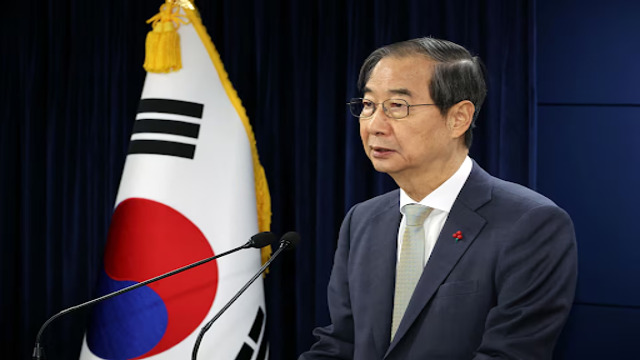
On December 14, 2024, Acting President and Prime Minister Han Duck-soo addressed the nation from the government complex in Seoul, South Korea. Reuters
South Korea’s parliament has impeached Acting President Han Duck-soo, adding to the nation’s escalating political turmoil. Han assumed the presidency after President Yoon Suk Yeol’s impeachment on December 14, which followed his brief and controversial declaration of martial law on December 3. The unfolding crisis has left South Korea’s political and economic stability hanging by a thread.
Finance Minister Choi Sang-mok, now serving as the acting president, immediately convened the National Security Council and engaged with key officials to stabilize the situation. “The government must work to ensure the people feel secure and that the country’s daily functions are not disrupted,” Choi stated. Despite his reassurances, Choi himself could face dismissal if conflicts with the opposition-led parliament arise.
The series of events has rattled South Korea’s economy, with the national currency, the won, falling to its lowest value in over 15 years. Analysts warn that continued instability could mirror the financial crisis of the late 1990s. “Political turmoil rarely bodes well for financial markets,” remarked an economic analyst.
The impeachment of Han was triggered by his refusal to appoint three Constitutional Court justices, a move the opposition labeled as unconstitutional. Han, in response, stated, “To avoid further chaos and uncertainty, I will suspend my duties and await the Constitutional Court’s decision.”
The motion to impeach Han passed with 192 votes in favor, while members of the ruling People Power Party (PPP) boycotted the session. PPP lawmakers labeled the decision as “tyranny,” arguing that the parliamentary threshold for impeachment was unconstitutional.
Constitutional Court and Public Sentiment
Meanwhile, the Constitutional Court has begun reviewing President Yoon’s impeachment, with a decision expected within 180 days. If Yoon is permanently removed, South Korea will hold a new presidential election within 60 days. Overwhelming public support for Yoon’s removal has been reported, driven by his controversial attempt to impose martial law.
At the heart of the crisis lies Yoon’s December 3 declaration, in which he justified martial law as necessary to address political deadlock and combat “anti-state forces.” However, his order was swiftly overturned by parliament just hours later, marking one of the country’s most significant political upheavals since the pro-democracy protests of 1987.
Adding to the chaos, former Defense Minister Kim Yong-hyun has been indicted for insurrection, becoming the first official to face trial over Yoon’s martial law declaration. Prosecutors are expected to pursue charges against other high-ranking officials involved in the incident.
The impeachment of both Yoon and Han has left South Korea in uncharted territory. While Choi Sang-mok attempts to navigate the crisis, doubts linger about his ability to restore stability amid persistent parliamentary opposition and economic challenges. South Korea, once celebrated as a beacon of democratic progress, now faces its gravest political crisis in decades.















